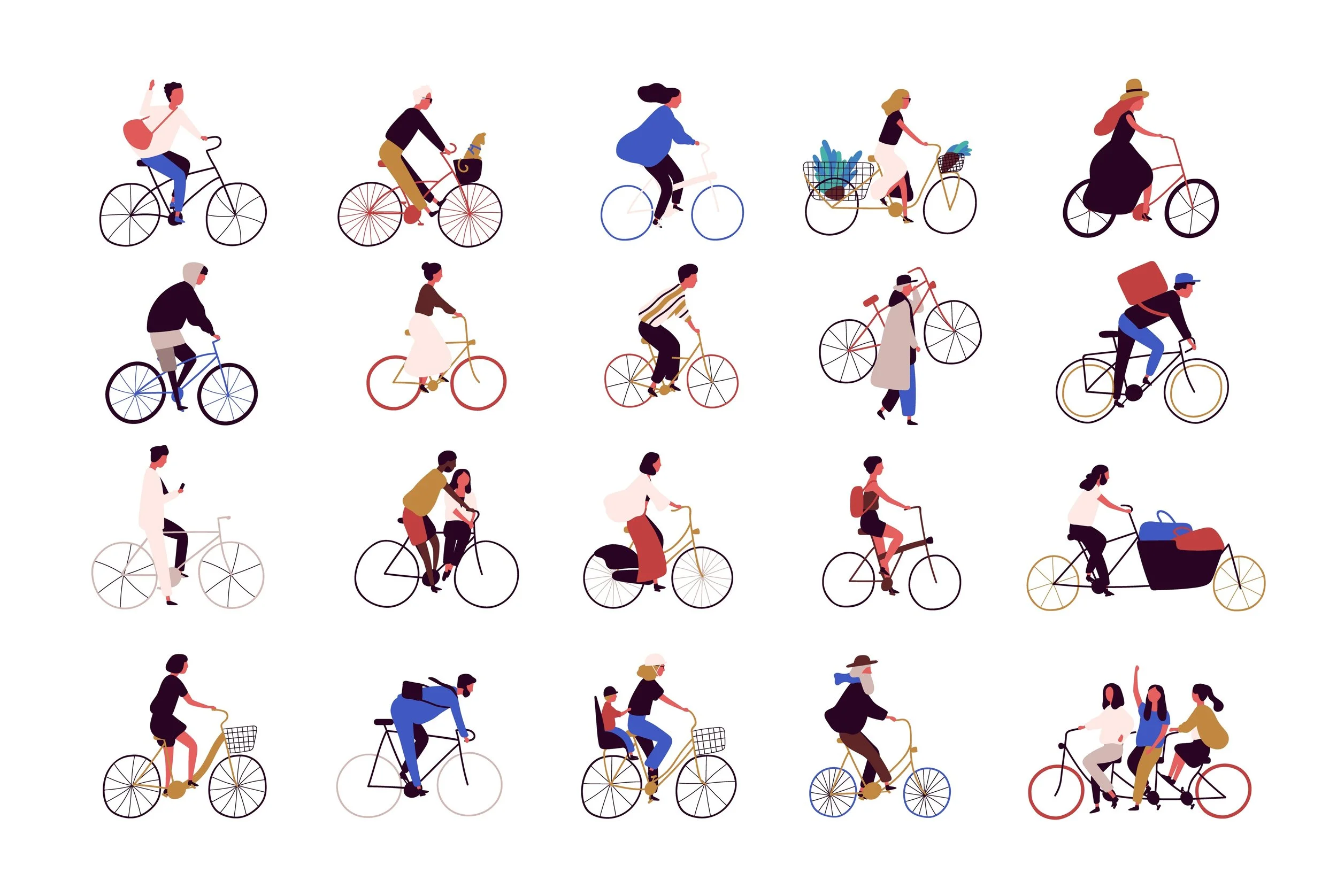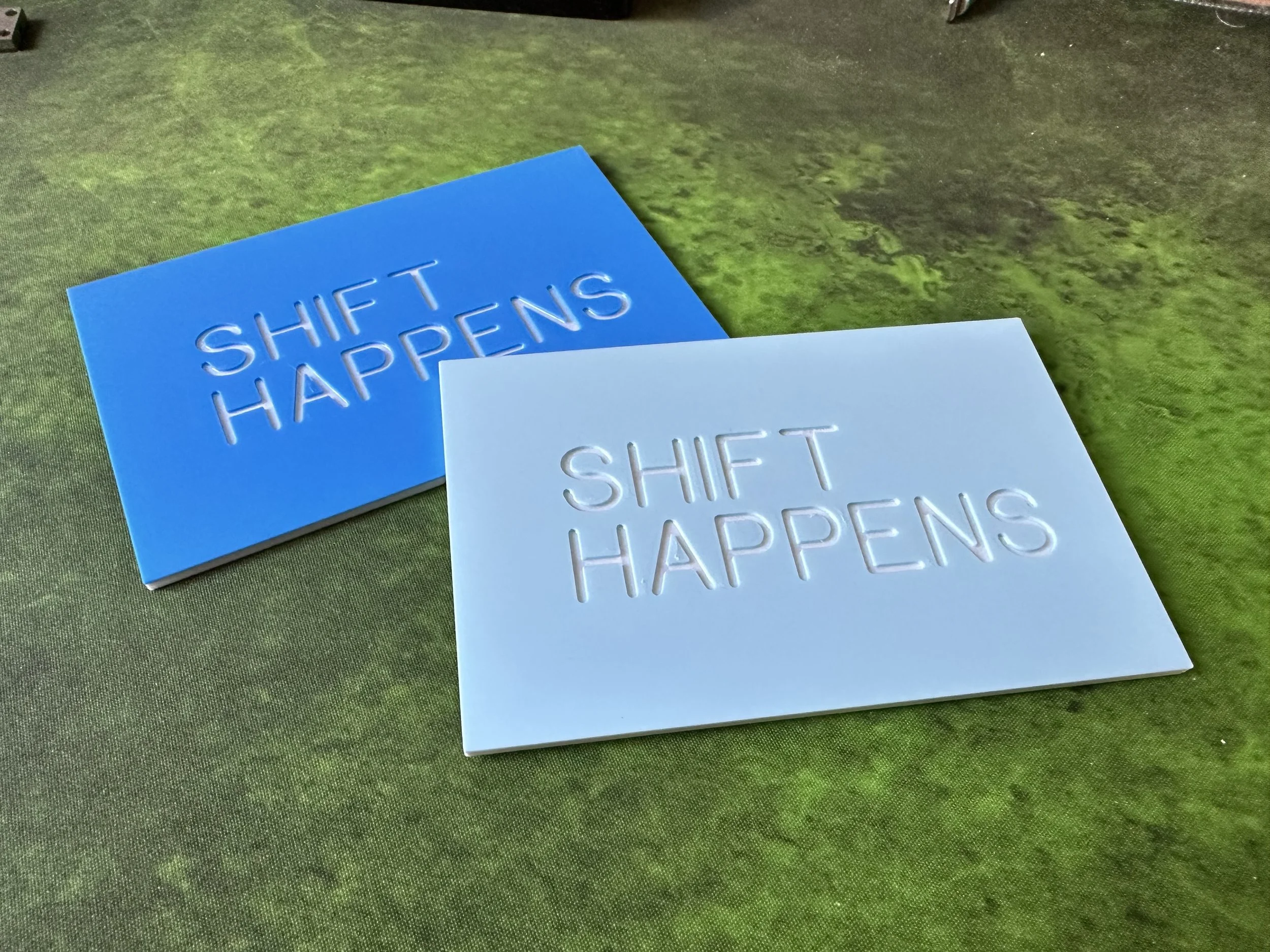the goal of this bachelor thesis or master thesis project is to design/prototype/evaluate a mobile app/website to support teenagers/young adults in acquiring/using/maintaining their first bicycle in vienna. in a research project, we have conducted interviews with bike users who rather use (paid) bike sharing services instead of owning a bike, because some of the risks and tasks associated with having a bike seem overwhelming.
steps in this project would be to research necessary information, think about a proper organization and presentation, and create (at least) a prototypical implementation of such a system or service, as well as the evaluation of the prototype. note that if you want to take on this project, you should already be a regular bicylce user.
the goal of this bachelor thesis project for one or two people or master thesis project for one person is to design, plan, implement and test an application using open streetmap to add free annotations to an OSM-based map via mobile phone. the app should work both on iOS and android, and it should anable closed groups of people to share a layer of annotations on this map. the sharing should be as light-weight as possible (eg. no registration & authentication, just exchange of a random code for use within a group). the annotation process should be free-form, mostly symbolic or freehand, and as simple as possible, with proper handling of eg. multiple annotations being added to the same area.
this project contributes to a current research project about youth mobility & public transport, and will ideally be evaluated in the context of this research project.
since about a year, the hci group offices have an automatic door for accessibility reasons. we have already installed a little bluetooth actuator that can press the button on command. also, there is a key switch to change the door from automatically closing after a few seconds to staying open.
from our day-to-day practice, we find that this setup creates a number of problems. eg. when you have a seminar, you want the door to stay open for the students to arrive, but when the seminar has started, the door needs to be closed again. usually, the lecturer forgets to close the door, which means it stays open, creating a nuisance in the hallway (it is a large door) and a security problem for us. a good solution for this problem would be if the door could see calendar entries and stay open and closed according to some simple rules, eg. 15 mins before and after a seminar starts.
the goal of this bachelor or master thesis project is to create an automation framework that allows us to experiment with such automations. this could eg. be a raspberry computer connected to some actuators, that can easily be accessed from within our network and told to eg. open the door (when the doorbell rings) or switch status. the project starts with user research within the hci group to find out what kinds of automations can be envisioned, and work from there to create a stable working prototype that can then be evaluated.
we have a makerlab at the HCI group: the physical design lab. researchers and students use the lab to produce all kinds of interesting, unique artefacts using 3D printers, laser cutter, knitting machine, etc. the goal of this bachelor thesis project is to design and implement an infrastructure that makes it easy to document these things, so that we have a gallery of cool physical design lab artefacts.
the resulting system should be easy to use, independent of external IT services and easy to maintain and administer. at the same time, it should offer at least rudimentary protection against abuse and spamming.
embedded ethics is an approach where lecturers in all courses are discussing ethics aspects regarding their own subject. a number of studies [eg. 1, 2] have been conducted indicating that this is a better approach than offering a seperated »ethics in technology« course.
some universities have created extensive »open source« repositories of the materials created by and for various lectureres that showcase the inclusion of ethics aspects into all kinds of subjects.
in this bachelor- or master thesis project, these materials will be examined for the use in teaching in mandatory courses of the TU wien informatics bachelor program. basically, each course at TU wien will be matched with appropriate entries in the repositories; then, the content of these entries will be translated and localized, and, where appropriate, materials will be produced. the results of these process will be documented in a format that also will have to be developed, and made available to the lecturers in the respective courses.
additional councelling by our resident AI ethics professor will be available.
It is completely unthinkable that somebody studies physics without learning about Gallileo or Newton, or philosophy without thinking about what Socrates or Kant wrote. Unfortunately, it is quite common to study informatics without knowing anything about the history of the discipline, or the origin of the ideas and concepts of informatics.
As a consequence, a lazy default story about US-american startups, run by white men, has taken hold. Since this is neither accurate nor flattering for the discipline, this master thesis project is focussed on the goal to picture a more inclusive story of the history of the IT industry, of the field of informatics, and of the ideas in this field. from this research, a card game (eg. trading card game), maybe based on a fantasy theme (like pride, prejudice and zombies) or similar to pokemon etc. should be designed and, ideally, deployed and evaluated.
while the game should be a real-world card game, it could have a digital component via QR codes or NFC tags.
Basis dieser Bachelorarbeit für 1 Person ist der Artikel The hardest working font in Manhattan. Der Artikel beschreibt, einen Font, bestenfalls unter dem Namen »Gorton« bekannt, der durch die Produktion eines Gravurgerätes ca. 1897 massenhafte Verbreitung zumindest an der US-amerikanischen Ostküste gefunden hat.
Um dem charakteristischen Schriftbild neues Leben einzuhauchen, soll eine Web-Applikation entwickelt werden, mit der aus eingegebenem Text 3D-Modelle gravierter Platten in hoher Auflösung entstehen können. Dabei sollen unterschiedliche Templates zur Auswahl stehen. Im Idealfall findet die gesamte Verarbeitung in JavaScript im Browser statt, sodass das HTML auf einfachen Webservern gehostet werden kann.
Für eine organisatorisch und inhaltlich komplexe Lehrveranstaltung (Denkweisen der Informatik) soll ein browser-basiertes Online-Planungssystem entwickelt werden. Mit Hilfe dieses Systems sollen Studierende in die Lage versetzt werden, personalisierte Kalenderdaten (iCalendar-Standard, für den Import in eigene Kalender) zu erstellen, die dabei helfen sollen, die Anforderungen und Abgaben der LVA zeitgerecht zu erfüllen. Die dabei entstehenden Planungsdaten sollen auch der LVA-Leitung zur Verfügung stehen.
Idealerweise ist dieses System als Teil von TUWEL angelegt. Ein früher Prototyp eines solchen Systems wurde bereits mittels der Datenbank-Komponente von TUWEL umgesetzt, wobei die Erfahrungen sehr gemischt waren. Im Idealfall bekommen Studierende ein Tool, mit dem Sie die durch Reihung und Priorisierung der eigenen Arbeiten über das Semester hinweg eine Reihe wirklich individueller Kalendereinträge generieren, mit denen die erfolgreiche Absolvierung der LVA (also der Leistungsanforderungen durch die LVA) unterstützt wird.
DIese Bachelorarbeit für ein bis zwei Studierende umfasst den Entwurf, die Gestaltung und Implementierung sowie den Test dieser Lösung, im Idealfall durch aktive Begleitung während des WS 2025. Dafür ist eine Anstellung als Tutor_in denkbar.
Es soll ein Online-Memory-Spiel entworfen, implementiert und getestet werden, mit dem das Lösen eines Memory-Spiels als notenrelevante Leisung in TUWEL ermöglicht wird.
In den »Denkweisen der Informatik« gibt es acht Kapitel. Um eine Überprüfbarkeit der Auseinandersetzung mit den Inhalten dieser Kapitel zu ermöglichen, wurden verschiedene Ansätze ausprobiert (Arbeitsblätter, Multiple-Choice Quizzes, Volltext-Leitfragen), die alle auf ihre eigene Art gescheitert sind.
Für das Wintersemester 2025 soll daher ein neuer Ansatz versucht werden: die »Schlüsselbegriff-Memory«-Spiele, die bisher im Rahmen des Game-Based-Learning-Ansatzes der LVA verwendet wurden, sollen online verfügbar gemacht werden, indem sie als notenrelevante Leistung in TUWEL umgesetzt werden.
Dabei bietet sich beispielsweise H5P als Technologie an, für das es als proof-of-concept bereits (mäßig brauchbare) Memory-Spiele gibt. Ziel der Bachelorarbeit für 1-2 Personen wäre, die Studierendenseite wie auch die für den geplanten Einsatzzweck optimierte Administrationsseite einer solchen Lösung zu entwerfen, gestalten, implementieren und evaluieren. Die Lösung soll im WS2025 eingesetzt werden.
Compared to online systems for collaborative authoring like the google office suite or miro, collaborative annotations of and communication about online documents is still quite underdeveloped. Medium tries to do a some highlight-sharing and inline annotation stuff which is certainly interesting, but maybe there is more.
If we consider reading documents not as a passive consumption of text, but an active process of structuring, organization and annotation (like it would be i a learning context), even more possibilities open up.
This master thesis for one or two candidates tries to develop a prototype of a system where readers collaboratively work with a given document with the goal to not only understand it, but enhance it with eg. current events, connotations, crosslinks to other materials, links into the internet etc.
Ultimately, the goal is to create an environment where the barriers between the roles of teachers and students get torn down, and both groups can benefit from each other.
Mastodon is a federated platform inspired by twitter (maybe). it is open source, open data format, and more or less surveillance free. Because this approach, conversations are more civil and often much more interesting than on big-tech-owned social media platforms. Unfortunately, current Mastodon clients make it hard to participate in these conversations, as they are shown as long linear lists, while they are often hierarchical.
The goal of this bachelor thesis project for a small team, or master thesis for one student is to design, implement and evaluate an iPad client based on a discourse visualization developed for the reddit client biscuit for reddit ca. 10 years ago (also in the course of a master thesis). The design has to be adapted to the unique affordances of Mastodon. Necessary hardware (iPad etc.) can be supplied by us.
If successful, the app can be maintained as a shared (commercial) project beyond the scope of the thesis.
in einem projekt sind mehrere »computational thinking labs« entstanden (beispiel). in diesen labs können unterschiedliche probleme des computational thinking eigenständig erarbeitet und ausprobiert werden.
einige dieser labs sind im rahmen mehrerer bachelorarbeiten entstanden und sind entsprechend verschieden. im rahmen dieser bezahlten bachelor- oder projektarbeit sollen die labs visuell, funktionell und technisch vereinheitlicht werden. die materialien und vorgaben werden von uns zur verfügung gestellt.
In Denkweisen der Informatik (ways of thinking in informatics), a unique first-semester course for all informatics bachelor students at TU Wien, we organized (more or less) weekly panel discussions where experts of the respective fields answer and discuss the students’ questions. To collect the questions, we use the Q&A-Tool of the zoom webinar format.
While this is readily available, it has some serious drawbacks, eg. questions can only be submitted once the webinar has started, while it would be helpful if students could post questions whenever they have them.
The goal of this master thesis project is to design and implement a little platform (probably using django) that mirrors the possibilities of the Zoom Q&A-tool and extends them in the direction we need it. There are some role models, like mentimeter, mukana or the old best and worst of informatics tool we used when Aurora was still around, but basically this should be designed from ground up along the necessities of its intended use.
with chatGPT and all the other future systems, a new problem in the evaluation of (not only) student’ work has emerged: the verification of references. chatGPT is known for fabricating references that look real but do not exist. a system that goes through a text, extracts all the references (usually collected in footnotes or in a list of references at the end, but sometimes inline) and verifies that these references actually exist seems like an easy task. .
when looking at the problem from a computational point of view, verifying an reference (especially in the light of different formats and standards) is not a trivial thing. even parsing the title and author(s) from such a reference can be a hard problem to solve, but algorithmically asserting that it is an actual reference is quite a challenge.
if well done, such a system can also be used to in verify web pages that all the linked material still exists and points to the right pages.
with all these requriements, creating such a system sounds like a really good challenge for a bachelor project + »bachelorarbeit«.
A format to translate lecture slides into a semi-booklike format has been developed and refined over the recent years. An example can be seen here:
https://dwi.lva.tuwien.ac.at/dwi20221117.html
Slidebooks are created using a convoluted pipeline of processing steps, from the creation of slides in Apple Keynote, the annotation of these slides using the »presenter notes« functionality in Keynote, the extraction of all content from Keynote using AppleScript, ImageMagick and curl and the encoding into a text-only format, to a python script that creates an HTML + javascript-file that can then be uploaded to a web server.
This pipeline is not only relatively slow, unreliable and error-prone, it is also a nightmare to maintain and update. The goal of this master thesis for one person is to take everything that has been learned so far, completely rethink the process and create a »service« that makes it easy to create slideBooks.
In addition, new elements for SlideBooks that enhance the interactivity (like quizzes, crosslinks between slidebooks, gameful elements) should be devised, designed and prototyped or implemented.
Dieses Thema wird im Sommersemester 2023 als Gruppenarbeit betreut. Mehr Information & Anmeldung: https://peter-purgathofer.squarespace.com/bewerbung-projektbachelor
ChatGPT has created a conundrum for teachers everywhere. Simple »text production« tasks are endangered by the glorious »stochastic parroting« qualities of chatGPT, and asking students/pupils to summarize something will soon be a completely useless assignment.
So discussions, how this can be avoided/mitigated/used productively have sprung up everywhere. Some US school districts are banning chatGPT, detection tools are being developed, and others try to find productive uses of the system in classes - and this is just a short overview over some reactions. As chatGPT can also produce quite competent code, these problems affect not only text-centered assignments, but also introductory coding or engineering classes.
In this bachelor thesis (in german or english language) for one or two students, the goal is to gain an overview over the current discussion, and develop mitigation strategies for first-semester university courses with 500+ students (like we have at TU Wien), especially in informatics-programs
smart phones are amazing collections of sensor technologies. can these sensors, especially location, orientation and maybe the camera be used to facilitate new forms of teaching and learning in the course »ways of thinking in informatics« (denkweisen der informatik).
the goal of this bachelor or master thesis is to find a simple and easy to adapt strategie that can be used to create »distribued« learning units. this includes looking at existing approaches like educaching, QR rallys or hybrid scavenger hunts,, designing and implementing elements of an approach that is easy to maintain and fill with content, and evaluate those elements with students in the context of a large first-year informatics course.
cory doctorow is an science fiction/tech fiction author creating books in amazing frequency. some of his books are set in a near future where the technologies seem absolutely realistic or at least almost possible. this diploma thesis will explores how realistic those the technologies really are? using some of his works as a starting point (esp. the trilogy little brother, homeland and attack surface as well as walkaway and the novella-collection radicalized) the work should examine how much of the technology described in a »near future« settings are attainable or available today. if they don’t exist, could they be implemented/created? should they exist? the work should pose and answer technological, ethical and political questions regarding the concepts of his books. ideally, a particularily interesting technology is implemented in a prototypical way.
zitate werden in videos gerne mit einer anderen stimme vorgetragen, also nicht von der bzw. vom vortragenden, sondern von einer passenden anderen stimme. zwei beispiele dafür finden sich in einem video von jan böhmermanns ZDF magazin royale vom 27.5.2002:
leider gibt es keine software (konkret für macOS), mit der man das visuell anspruchsvoll, aber auch einigermaßen einfach automatisiert als video produzieren kann. dabei sind die requirements hier wirklich klar definiert.
im rahmen einer bachelorarbeit für eine oder zwei personen soll eine software auf macOS implementiert werden, mit der das einfach möglich gemacht werden soll. neben der einfachen bedienung und dem export als video steht dabei die qualität des gesprochenen texts im vordergrund. dafür sollen existierende services mit hervorragender qualität (zb. von amazon oder google) genutzt werden. entsprechend ist eine evaluierung dieser services (qualität, kosten, verfügbarkeit) teil der bachelorarbeit.
ein wesentliches element der software ist weiters, dass man das erscheinungsbild des textes detailliert definieren kann, um den visuellen anforderungen der videoproduktion gerecht werden zu können. über eine mögliche kommerzielle verwertung kann gerne auch nachgedacht werden.





















